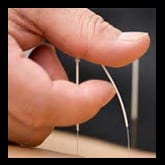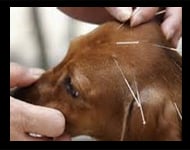
What is acupuncture?
Acupuncture is a treatment that is part of Traditional Chinese Medicine (TCM).
To define acupuncture, think outside the box for a minute. This needle therapy is applied by inserting and manipulating specifically designed needles into particular points on the body.
Each point is selected for correcting an imbalance in the system and to maintain optimum health. While it seems unfathomable to those who have not experienced it, acupuncture treatments can be powerfully effective.
Acupuncture benefits
Acupuncture benefits are vast and numerous. So much so that we can only include a portion of them here. It is the benefits of acupuncture that have brought this holistic healing method out of the dark here in the States.
As health insurance costs and restrictions rise, individuals are exploring more natural ways to heal the body. Alternative medicine and all of its forms are receiving more consideration by US citizens than ever before.
So, what is acupuncture used for? Following is a partial list of health concerns that acupuncture treats.
- accident trauma
- addictions
- allergies
- anxiety
- arthritis
- asthma
- back pain
- constipation
- degrees of paralysis
- depression
- digestive disorders
- fatigue
- frustration
- glandular dysfunction
- headaches or migraines
- hormonal imbalance
- infections
- infertility
- menopause
- neck pain
- sciatica
- stress
- tendonitis
- thyroid imbalance
- weight gain
- worry
- wrinkles

As you can see by the list, the health benefits of acupuncture are virtually endless. In addition, one can see how treating one ailment with acupuncture could easily resolve other concerns simultaneously.
An example of this would one where the person chooses acupuncture for anxiety. After the session, they would experience less anxiety which would lower their blood pressure. When the body is in a calm, peaceful state, the digestive system operates more efficiently, easing digestive disorders.
In addition, when the body is stressed, the hormones are struggle to find balance. When they are in harmony, the body’s blood sugar levels and weight do not fluctuate as much. Headaches and migraines are kept at bay or eliminated, etc.
Via this one example, it becomes clearer how acupuncture has the ability to treat the entire body with each session.
This is an amazing approach to positive health. Even if you do not have pain or a health concern you wish to address, this is a most relaxing and energy balancing therapy.
If you have particular concerns and you don’t want to use conventional medicines, this is a great place to start.
What to expect from this treatment
Every acupuncture treatment will differ, as with any alternative medicine session. Wear loose fitting clothing, shorts, t-shirts or other items that reveal skin on the arms and legs.
In general, for your initial visit, an Acupuncturist might start by asking questions and taking your pulse at your wrists while looking at your tongue.
This consultation will provide them with valuable information about your body.
They will discern areas where your chi (vital energy that flows throughout the body), has become blocked or stagnant. This is very helpful in indicating early warning signs of serious ailments that could be developing.
Then the practitioner will guide you to a room and tell you which clothing articles need to be removed (if any) in order to insert the needles.
They will wipe your skin with rubbing alcohol at various points. Next they will insert specialized, sterile needles into those points which are along the acupuncture meridians that require clearing.
Once all needles are in place, the Acupuncturist might apply electric stimulation to certain needles to expedite the healing process. This option is not always used but if they feel it is necessary, they will implement it.
They will then leave the room for a while and let you relax. If at any time you are uncomfortable, they will be readily accessible to make adjustments.
Most people go into a deep state of relaxation during their treatment. Others actually fall asleep, it is so peaceful.
When your treatment is over, they will return to remove the needles and send you on your way.

Does acupuncture hurt?
A common question asked is “Does acupuncture hurt?” The answer varies, but in general no.
However, occasional discomfort is not uncommon at first insertion of a needle. If this happens, it is usually because that point is blocked and needs to be cleared.
If that area is particularly stressed, the discomfort might continue throughout the session. Always ask your practitioner about it if it is too uncomfortable. Often they can either adjust the needle or use a different point along the same meridian for results.
Generally, the insertion is painless and unnoticeable. The most noticeable points (other than those under stress) would be ones without muscle, such as in a finger or in the forehead. But again, it would be barely noticeable.
After your session and how often to receive it
After your acupuncture treatment, you should feel quite relaxed. Drink plenty of water throughout the day.
Depending on why you went in the first place, you might learn that you have found relief from pain, a headache or cramps.
On occasion, there could be bruises at the needle’s insertion points. This is normal. In addition, many Acupuncturists also sell a variety of herbal remedies. They might suggest something to assist your healing process or to clear whatever imbalances they found.
Keep in mind that some treatments will stir things up within the body that might cause discomfort prior to feeling better.
This is not uncommon, as the body needs to get rid of the toxins and the problem itself. An example of this would be the fever associated with the flu. The fever is uncomfortable but necessary for the body to sweat it out.
Go as often as you can for acupuncture, or as suggested by your Acupuncturist.
If you are aiming for a cure, you will probably be asked to come in every day for at least a week. Don’t be alarmed.
This is to keep the energy at the surface for quicker healing and will actually be much more effective than if you spread out the treatments over several weeks.
After the first week, it is possible that you will be asked to come in every other day for another week or two. Gradually your practitioner will ease your appointment frequency back according to your specific needs or a maintenance program.
Always consult with them about how often to go, tell them about any new developments or how you are feeling in between appointments. Ask any questions as they arise.
Categories for Acupuncture
Alternative Therapies
Energy Healing Techniques
As an affiliate, we earn a small commission for qualifying purchases via links on this site. The commission is paid by the advertiser and does not affect the price of the product or cost the consumer. It is how we help pay to keep this site free to use!
